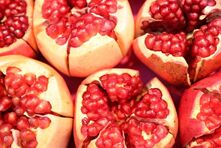研究表明,吃这些果蔬能防晒
|
In terms of protecting yourself from sun damage, sun protection is the most important, like wearing a broad-spectrum sunscreen with an SPF of at least 30, along with sunglasses and hats, "but I would put diet right behind that — and that's because there are so many components that you can consume from foods that have all these different protective effects," said Dr Rajani Katta, author of Glow: The Dermatologist's Guide to a Whole Foods Younger Skin Diet. "There are definitely foods that we can eat that can boost our ability to protect our skin from the sun," said Dr Patricia Farris, a dermatologist and fellow of the American Academy of Dermatology.
Antioxidants: edible sunscreens Carotenoids, along with polyphenols like EGCG in green tea, offer natural sun protection. Carotenoids and polyphenols accumulate in skin and absorb sunlight of various wavelengths, according to Farris. But the skin benefits of these natural compounds are primarily due to their antioxidant activity. Along with antioxidants like vitamin C and vitamin E, they protect against free radical damage to cells that's generated from the sun's UV rays, which can cause skin aging. When antioxidants stop free radicals in their tracks, they also prevent DNA damage, thereby decreasing mutations and reducing the risk of skin cancer, Katta explained.
Supplements as sunscreen Though antioxidants from foods confer sun protection to skin, consuming them in supplement form poses risk. A study from France found an increased incidence of melanoma in women who took an antioxidant supplement. "These results were totally unexpected, and the increased risk of skin cancer disappeared after the antioxidant supplement was discontinued in a five-year follow-up study," Farris said.
Edible sunscreens: a shopping list For younger-looking skin, your diet should include plenty of antioxidant-rich foods to help decrease sunburn and neutralize free radicals that lead to skin aging and the potential for skin cancer. In addition to providing antioxidant protection, fruits and vegetables boast fiber, which feed bacteria in your gut, making your skin's barrier less prone to irritation and less likely to lose moisture, Katta explained. Tomatoes Tomatoes are an excellent source of lycopene, an antioxidant pigment that may play a role in protecting against sunburn. In one study, sunburn formation was significantly lower among those who consumed a small amount of tomato paste daily for 10 weeks. While fresh tomatoes are also beneficial, lycopene is actually better absorbed when tomatoes are processed, especially with olive oil. Sweet potatoes and spinach Sweet potatoes and spinach are rich in beta carotene, another carotenoid that helps decrease redness in skin when it is exposed to UV light. Berries, grapes and pomegranate Raspberries, strawberries and pomegranate deliver ellagic acid, while red grapes are rich in resveratrol. Oranges, grapefruit and kiwi Oranges, grapefruit and kiwi are loaded with vitamin C, which protects against free radical damage from the sun that can cause skin aging. Fatty fish A diet rich in omega-3s from fish oil can help make sunburn less severe and may help prevent the development of skin cancer, according to research. Salmon and sardines are all excellent sources of omega-3s. Flaxseeds and walnuts These plant-based omega-3s are also important for skin health. They prevent moisture loss from cells, which keeps skin supple, and they are a source of the skin protective antioxidant vitamin E.
Sipping your sunscreen Drinking coffee may help lower the risk of malignant melanoma. In one study, four cups of coffee was associated with a 20 percent decreased risk of the disease. And green tea contains beneficial polyphenols called catechins, which may help protect skin from sun damage and skin cancer, according to preliminary research. |









